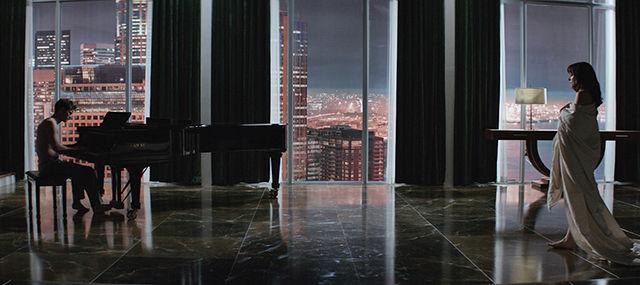
SOURCE: FIFTYSHADESMOVIE.COM
Well. They did the best that they could.
“Fifty Shades of Grey” was never going to be a good movie. It was doomed from its conception, what with its casting troubles and its terribly written novel. Nevertheless, “Fifty Shades” is more competent than it has any right to be. Though, this isn’t saying much. It’s about as good as a movie based on an awful, logic-bereft, fanfiction-based novel could ever be.
Director Sam Taylor-Johnson and lead actress Dakota Johnson attempt valiantly to elevate this movie from its abuse-glorifying source material. While they succeed, they only manage to take a horrific narrative and transform it into a blander, toothless version of its parent.
Dakota Johnson is, quite simply, fantastic. And frankly, she deserves so much better than this drivel. She improves upon the terrible character of Anastasia Steele, accomplishing the impossible by making Ana likeable. Johnson carries the entire movie herself, bravely propelling it forward in a way the threadbare plot could never manage. Johnson imbues “Miss Steele” with agency, something the book neither considered nor cared about.
Opposite Johnson is Jamie Dornan, the regrettable and eponymous Christian Grey. Grey here is most certainly less abusive and controlling than his book counterpart. That is to say, here he is still remarkably cruel and manipulative. Dornan delivers everything in a stony voice glazed with a transparent American accent. Although Johnson struggles intrepidly to establish a rapport with her co-star, she strives in vain as Dornan tries his hardest to emulate a sexy brick wall. Needless to say, the chemistry between the two is relatively nonexistent.
Despite Taylor-Johnson cutting about 80 percent of the original novel’s problematic content, the movie still maintains some overt abusive overtones. The director completely drops Ana’s inner monologue (her childlike “inner goddess” and “subconscious” remain silent, thankfully, and Ana’s notorious and inexplicable woman-hating goes unmissed), but she was unable to wholly eradicate the abusive nature of the horrid excuse for a human being that Christian Grey embodies.
He sends her expensive gifts, despite her protests. He sells her car without her knowledge or consent. He lets himself into her apartment because she says something to which he contests. He stalks her all the way from Washington to Georgia. He refuses to tell her more information about what he wants out of their relationship, yet expects total honesty from her. She expresses discomfort concerning her “punishments,” and he all but ignores her in favor of his own desires. There you have it: every woman’s apparent dream man, Christian Grey.
Taylor-Johnson’s direction is lacking, though this may be symptomatic of the clashes she and series author, E.L. James, had on set. We wind up with a lackluster, boring product that infrequently verges on artful. “Fifty Shades” is disappointingly tasteful and severely lacking in what the smut readers were promised. Instead, viewers are constantly bombarded with different shades of grey in an on-the-nose endeavor to engage the masses with obvious, name-dropping, “clever” color schemes. Get it? Fifty shades of grey?
Unfortunately, the movie doesn’t get rid of the immense misrepresentation of the BDSM community that the books perpetuate. In fact, the notion that only severely disturbed people practice sadomasochism is hammered forth by our favorite sociopath, Mr. Grey himself. When Ana presses him on why he wants to “punish” her, he replies that he is “fifty shades” of messed up.
One gets the sense that Taylor-Johnson wanted desperately to deviate from the source material. This is evident especially in the very last scene of the movie, a scene that is, in all seriousness, gripping and difficult to watch. The nature of their relationship unravels and Christian continues on as Ana heartrendingly breaks down in tears. As Ana leaves, we cheer for her, because, in this moment, she is safe.
The ending is tragic not because it ends with the termination of Ana and Christian’s relationship. It is tragic because we know her abuse will eventually continue. We know the two will get back together. If this ending served as the resolute end to this story, the narrative would detail a young woman’s escape from a violent relationship. Instead, it acts as a cliffhanger. Ana’s trivialized abuse is simply an obstacle standing in the way of romance.
“Fifty Shades of Grey” wasn’t a good movie. However, it was a better adaptation than the infamous novel ever deserved. Though Taylor-Johnson and Johnson endeavor in a manner similar to Anastasia to save the movie from itself, they can’t help but be dragged downward by the spiraling undertow that is, undoubtedly, one of the worst things ever to be published.